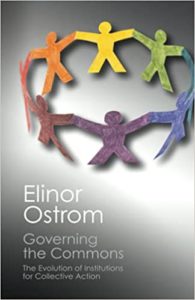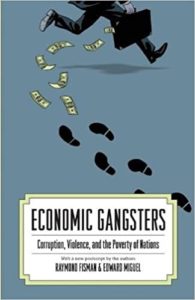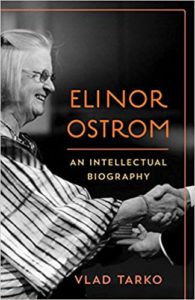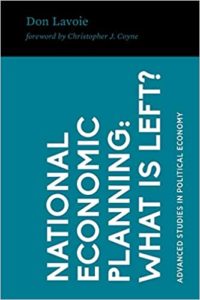On April 10th, a Twitter account called “Art of Life” posted a list of “20 books to read in your 20s.” This resulted in a trend in which many Twitter users, including me, gave our own lists of 20 books. In this post, I’d like to elaborate a bit on why I chose each book.
1- Governing the Commons by Elinor Ostrom

This book is a wonderful mix of rational choice theory and real-world empirical evidence. Many social scientists embraced a false dichotomy when it came to the “tragedy of the commons.” They believed that common-pool resources would inevitably be depleted, unless the resources were privatized or the users were regulated from the top-down by a centralized government. Elinor Ostrom looked at the empirical evidence and found that the range of possible solutions to commons problems was much wider. Resource users could talk with one another and engage in self-governance to preserve the resources they use. And in fact, they have done so many times. Self-governance is not a panacea, but this book provides a great examination of how it can work, and when it fails.
2- The Struggle for a Better World by Peter Boettke
Classical liberalism all too often is seen, especially by its critics, as a conservative program, a defense of the status quo. But it’s fundamentally a doctrine of emancipation from oppression. This collection of essays by Peter Boettke does an outstanding job of laying out the humane and emancipatory vision of liberalism, and in the process Boettke also explains a lot of important insights from economics and political economy.
3- Manufacturing Militarism by Christopher J. Coyne and Abigail R. Hall
As I noted in my review for Econlib, this book masterfully applies public choice theory to examine the deadly serious issues of war, militarism, and government propaganda. Reading this is a great way to understand public choice, and a very important read for addressing the serious harms of militarism.
4- Economic Gangsters by Raymond Fisman and Edward Miguel

I first read this book before I started graduate school. There’s a lot to like about it. One is that the authors discuss how culture, violence, corruption, and other key institutional issues relate to the wealth and poverty of nations. They are development economists, and they do a great job of conveying why development is important and the broad range of issues that influence development. They also very effectively communicate the intuition behind the causal inference strategies that they’ve used in their academic research. Some of the strategies they used, such as the use of rainfall as an instrumental variable, have faced serious criticisms. But this book offers a really accessible way to understand why causal inference is difficult and what strategies social scientists use to try to assess causality.
5- Empire of Borders by Todd Miller
This book explores how the U.S. Border Patrol has engaged in operations around the globe. We often think of the Border Patrol as simply patrolling U.S. borders, but they now also act as an instrument of U.S. foreign policy. This book helped inspire my paper with Chris Coyne on “U.S. Border Militarization and Foreign Policy: A Symbiotic Relationship” (which was recently published in the Economics of Peace and Security Journal). The book also influenced my working paper on “Border Militarization as an Entrepreneurial Process.”
6- Political Capitalism by Randall Holcombe
People across the political spectrum lament the role that entrenched, elite interests play in politics. Randall Holcombe leverages the insights of Ronald Coase to explain political and economic power. He argues that for most people, the transaction costs of engaging in political exchange are prohibitively high. But some political and economic elites constitute a “low transaction cost group” and can therefore make political bargains, often at the expense of the rest.
7- Liberalism by Ludwig von Mises
Much like Boettke’s The Struggle for a Better World, this classic by Ludwig von Mises lays out an inspiring case for liberalism, and weaves in many important economic insights. This book also contains some of Mises’s most controversial passages, so reading those in-context is helpful if you want to participate in contentious conversations about Mises’s legacy.
8- Beyond Politics by Randy Simmons
This book is my favorite introduction to public choice. In addition to covering public choice, it also offers excellent insights on key issues like property rights. The book has lots of great examples to illustrate the theory, and each chapter ends with suggestions for further reading. An excellent resource.
9- Domination and the Arts of Resistance by James C. Scott
This book examines how hierarchical power can distort the conversations people have. Think about it this way: if you express your grievances with your boss too harshly, then you are likely to get fired. If a peasant told the king that he was a fool, then that peasant might be executed. The incentives are clear, and this results in what Scott calls “hidden transcripts,” which are discourses among subordinate groups that are not heard by groups that hold power.
10- Elinor Ostrom: An Intellectual Biography by Vlad Tarko

This is my favorite overview of Elinor Ostrom’s work. I’m often inclined to recommend it instead of Governing the Commons when people ask me how they can learn more about Ostrom. Governing the Commons covers one very important part of Ostrom’s research program. Tarko covers it all, from her early research on municipal water governance to her work on polycentricity and municipal policing to her later work on the commons. He shows how this research program fits into an overarching research agenda about self-governance. If you want to understand self-governance, and what Elinor Ostrom’s research can teach us about it, read this book.
11- Open Borders by Bryan Caplan and Zach Weinersmith
Unlike all the other books on this list, this is graphic nonfiction. It’s a comic, illustrated by Zach Weinersmith of the outstanding web comic Saturday Morning Breakfast Cereal. Caplan and Weinersmith illustrate how immigration restrictions trap people in poverty, and in the process prevent them from enriching others through mutually beneficial exchange. Given the sheer gains from trade that immigration restrictions prevent, they require a very strong justification. Caplan and Weinersmith examine many of the arguments for immigration restrictions and ask whether social scientific evidence supports the concerns these arguments rest on.
12- Collective Action and the Civil Rights Movement by Dennis Chong

Like Elinor Ostrom’s Governing the Commons, this book uses game theory, rational choice, and careful examination of historical evidence to examine how groups of people can devise solutions to collective action problems. In this case, the collective action problem concerns how to get people to participate in a social movement, especially when doing so is risky and the change sought is a public good.
13- The Limits of Liberty by James M. Buchanan
James M. Buchanan is a legend, one of the seminal thinkers in public choice. In this book, he offers a contractarian account of the state, offering a case for limited, constitutional government and an analysis of where both government and anarchy can go wrong. As an anarchist, I found this book to be a challenging one, but a challenge worth facing and thinking through head on.
14- The Rise and Decline of Nations by Mancur Olson
Mancur Olson is best known for his classic The Logic of Collective Action. This book extends the implications of his argument there. Since narrow special interest groups are better able to resolve collective action problems than the general public is, societies tend to develop various distributional coalitions and special privileges as they develop. This eventually slows down development and causes serious decline, unless this entrenched interest group power can somehow be dislodged.
15- Anarchy Unbound by Peter Leeson
In this book, Peter Leeson makes two simple but important points. First, self-governance can work even in situations where people might expect it to fail, such as scenarios that involve a wide diversity of participants. Second, sometimes the feasible forms of stateless cooperation are preferable to the feasible type of state that a society is likely to have. Through history and sound economic theory, Leeson shows how self-governance has been underestimated.
16- Theorizing Feminisms edited by Elizabeth Hackett & Sally Haslanger
I first read this book in a college class on feminist philosophy. What I really appreciate about it is the wide range of feminist perspectives it covers, including classical liberal feminism, second-wave radical feminism, Marxist feminism, intersectional feminism, and postmodern feminism. I highly recommend it if you want to understand the nuances and diversity of feminist thought.
17- Managerial Dilemmas by Gary Miller
I read this book as part of studying for the Institutions and Development field exam at George Mason. It’s a really compelling analysis of the challenges associated with management, team production, and principal-agent problems. Miller proposed institutional solutions are insufficient, and then offers a nuanced discussion of the role of culture within firms.
18- National Economic Planning: What Is Left? by Don Lavoie

This might be my favorite book of all time. Before I read this book, I did not properly understand the knowledge problem and its implications for markets and central planning. Lavoie offers a great explanation of the pitfalls of national economic planning. What’s more, he does so from a perspective that is explicitly radical and emancipatory, which makes his arguments more likely to reach socialists where they’re at.
19- Resistance Behind Bars by Victoria Law
This book explores the experiences of women in American prisons, both the human rights abuses they suffer and the ways they resist. Rather than treating well-intentioned reforms as necessarily beneficial, Law argues that various types of reforms backfire. She shifts the prism away from what benevolent policymakers could to what prisoners can do for themselves. I reviewed this book a while ago at the Center for a Stateless Society.
20- The Social Order of the Underworld by David Skarbek
Skarbek’s book analyzes the development of prison gangs. He argues that their purpose is to provide governance in prisons where the population has become too large for informal governance such as the reputation-based “Convict Code” to function. This book is an engaging account of how governance works and how incentives and constraints shape the evolution of governance institutions.


READER COMMENTS
Todd Moodey
May 30 2022 at 11:25am
Nathan–
Thanks for sharing this interesting list. I’ve read a few of the works, and others by some of the authors on the list. I’ve long wished that Russ Roberts would do an EconTalk with James Scott.
Regards,
Todd Moodey
nobody.really
Jun 2 2022 at 11:32am
Thanks for this list; as a regular critic of libertarianism, I suppose I really should get around to reading about Elinor Ostrom’s work. But would the list differ for people older than 20 who had not gotten around to reading these volumes?
I’m blessed/cursed with a dog who demands company on her walks, but is a rather poor conversationalist–so spend many hours listening to books. Indeed, I’ve spent so many hours that I long ago passed my 30th birthday.
Patrick T Peterson
Jun 6 2022 at 7:13pm
Nice to see Liberalism by Mises on this list, love it. That book is far too little known.
A book I also read in my 20s that I would also recommend is Capitalism: The Unknown Idea by Ayn Rand and others. Some great historical, philosophical and economic essays in that book that easily stand the test of time.
One more book that also is a collection of great essays: “Shorter Classics” by Eugen Böhm-Bawerk.
Comments are closed.